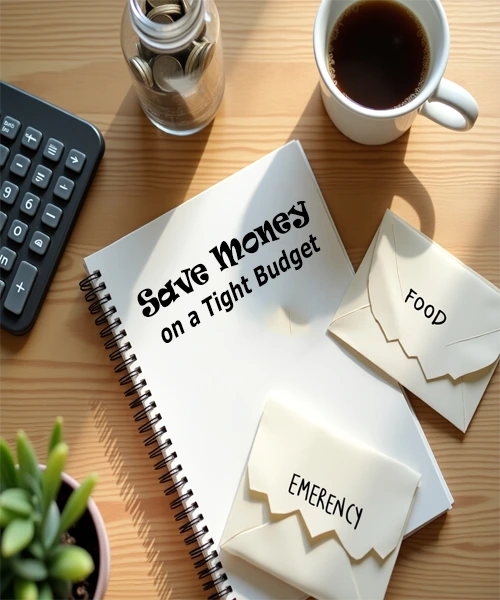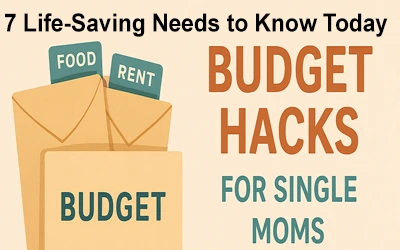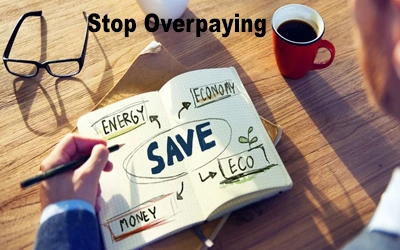
How To Save Money On a Tight Budget
How to Save Money on a Tight Budget: 30 Practical Ideas That Actually Work
How to Save Money on a Tight Budget: 30 Practical Ideas That Actually Work
Many people think that saving money is a very difficult task when their income is low. Especially if an emergency expense suddenly comes, then their head is spinning. But do you know? With the right attitude and some simple strategies, no matter how low their income is, saving money is not impossible at all. Here I will tell you 30 practical ways that will help you live a comfortable life in a place like the USA and save at the same time.
You may want to secure your future with emergency money, reduce debt, or save some extra money to fulfill small dreams. Whatever it is, these will guide you in the right direction. If you apply them gradually, you will see that saving money is not difficult at all, but rather a fun experience.
Why Saving Money on a Tight Budget is So Important
When cash is tight, every little bit counts more than you might think. Putting some money aside isn’t just for emergencies — it also gives you peace of mind. It helps you get ready for whatever comes next, opens up chances you didn’t expect, and most importantly, keeps you from falling into money trouble.
Now, I get it — changing how you spend isn’t easy. Old habits die hard, right? But honestly, a bit of patience and small changes here and there can lead to big savings over time. You might be thinking, “I barely make enough, how can I even save?” but trust me, with some planning and the right attitude, it’s totally doable. Little by little, those small steps add up before you know it.
How to Save Money on a Tight Budget: 30 Practical Ideas That Actually Work
Each idea below is designed to be practical, straightforward, and realistic — perfect for anyone struggling with finances.
1. Track Every Dollar You Spend
Many people don’t know where their money is actually going, so the budget gets out of hand. It is very important to record everything, including your daily expenses, small purchases, bills. If you want to start this, write down everything for the first month. Use modern smartphone apps such as Mint, YNAB (You Need A Budget). They track all your income and outgoings and divide them into different categories. When you clearly see where you are spending more, it will be easier to reduce unnecessary expenses. Gradually, this habit will help you control your finances.
2. Create a Realistic Budget and Stick to It
So, once you know where your money’s actually going, it’s time to set up a budget that fits you. Think about what you gotta pay every month—like rent, food, bills, and getting around. Then whatever’s left, split it up for stuff like doctor visits, school, fun things, and whatever else you need. Be real with yourself and don’t spend on things you don’t really need. Try to peek at your budget often, maybe once a week, even daily if you can. Change it up when you gotta. Sticking to a budget makes saving easier and keeps the money stress away later on.
2. Create a Realistic Budget and Stick to It
So, once you know where your money’s actually going, it’s time to set up a budget that fits you. Think about what you gotta pay every month—like rent, food, bills, and getting around. Then whatever’s left, split it up for stuff like doctor visits, school, fun things, and whatever else you need. Be real with yourself and don’t spend on things you don’t really need. Try to peek at your budget often, maybe once a week, even daily if you can. Change it up when you gotta. Sticking to a budget makes saving easier and keeps the money stress away later on.
Save Money When You're Broke
3. Cut Down on Dining Out and Takeout
Eating out or taking out can quickly eat up your budget. Fast food or restaurant meals often come with additional taxes and tips. Start planning meals in your own kitchen. Cook a big batch once a week and store it in the fridge, and eat it as a fresh meal on a busy day. This process not only saves money, but also helps you eat healthier. Cooking your own food makes it easier to control the quality of the food and is more nutritious than fast food.
4. Use Cash Instead of Cards
When you shop with cards, you often have to go overboard. If you use cash, you will only spend what you have taken. Withdraw a certain amount of cash for the week and keep it for additional expenses. This reduces unnecessary expenses and allows you to spend money consciously. Many people have found that the pressure of cards leads to spending a lot of money, while cash payments reduce it. A small cash budget system will increase your financial control.
5. Cancel Unused Subscriptions and Memberships
Man, sometimes we keep paying for stuff we don’t even use—streaming, gyms, magazines, cloud storage… all that. Take a minute and check your bank or card statements to see if you’re still paying for things you forgot about. Cancel whatever you don’t need anymore and boom—instant savings. Even if it’s just a few bucks a month, it adds up by year-end. It’s like free money if you ask me.
6. Shop with a List and Stick to It
When you go shopping without a plan, you tend to buy unnecessary things. Make a detailed shopping list before every shopping trip. Buy only what is on the list and avoid spending time in other sections of the store. Following this habit will bring consistency to your budget. The first step to saving is not to give in to the temptation of sellers, even if you are not interested. Planning your purchases in advance will keep your money safe.
7. Buy Generic Brands Instead of Name Brands
Most of the time, the quality of generic brand products from warehouse stores is not less than that of famous brands, but the price is much lower. You can save a lot of money by choosing name brands for things like canned food, cleaning products, and medicines. Many times, their ingredients and performance are almost the same. This method is very effective for economical shopping. Even if you are skeptical about unknown brands at first, try it once.
8. Use Coupons and Cashback Apps
These days, there’s loads of apps that give you coupons or cashback when you shop online or in stores. Apps like PrizePursuit, Honey, Ibotta—they all hook you up with discounts or money back. It might feel small at first, but trust me, it stacks up. You can take that cashback out later or turn it into vouchers. So before you hit checkout, always check if there’s a deal. Why not, right?
9. Shop Off-Season for Clothes and Gifts
Want to save a decent chunk of cash? Try buying clothes and gifts off-season. For example, you can grab winter coats in spring or bathing suits in fall because stores want to clear out old stock and usually drop prices. You get good stuff but pay way less. Plus, shopping early means no last-minute panic buying. Trust me, this trick works better than you’d think.
10. Reduce Utility Bills by Conserving Energy
Cutting down your bills doesn’t have to be hard. Just turn off lights and unplug gadgets when you’re not using them. In winter, turn down the heat a bit. And in summer, try using a fan instead of cranking up the AC. Switching to energy-saving bulbs might cost a little upfront but saves you money over time. Also, don’t waste water — it helps your bill and the planet too. These small things add up big time.
How To Save Money On a Tight Budget
Frugal Living Tips for Low Income Households
11. Cancel Cable and Use Streaming Services Selectively
The monthly fee for cable TV is high, and many people don’t even use it that much. Instead, use affordable streaming services. Choose the essentials from services like Netflix, Hulu, Disney+. Sharing an account with family members helps you split the cost. This will greatly reduce the cost of entertainment. Cancel unnecessary cable plans and opt for digital alternatives.
12. Sell Items You No Longer Use
You can earn cash by selling unused items in your house. You can sell old clothes, electronics, furniture, etc. on eBay, Facebook Marketplace or Craigslist. It is not only a way to clean your house, but you can also manage extra expenses by selling unnecessary items. In addition, selling old things creates an opportunity to earn money again.
13. Automate Your Savings
As soon as you get your paycheck, automatically transfer a certain amount of money into savings. This saves regularly and the deposited money grows later. Even if you save small amounts, the total savings at the end of the month can be surprising. It is also a way to reduce stress, because you do not have to think separately about saving money. This is also called the “Pay Yourself First” principle.
14. Limit Credit Card Use and Avoid Interest
Be careful when using credit cards. Pay off your balance in full at the end of the month to avoid high interest charges. While it is easy to spend with a credit card, interest can add up in the future. Use your card only for urgent or planned purchases and pay on time.
15. Use Public Transportation or Carpool
Driving everywhere and paying for parking can quickly eat your budget alive. Taking public transit can save you quite a bit day to day. If you can, carpool with coworkers or neighbors — sharing gas costs makes a difference. And if your trip’s short, why not walk or bike? It’s free and good for your health too. Cutting transport costs is one of the easiest ways to save money without much effort.
16. DIY Household Repairs and Maintenance
Doing small household chores yourself can save you a lot of money. There are many videos on YouTube that can teach you simple tasks like painting, installing light fixtures, and installing light fixtures. It reduces the hassle of calling a professional in an emergency, and it also has a good impact on the budget. Take some time to improve your skills, the benefits are much greater.
17. Buy in Bulk for Non-Perishables
Buying non-perishable products like toilet paper, cleaning spray, canned food in large quantities reduces the price per unit. Storing them well saves you from having to buy them repeatedly and saves money. Buying in bulk is more profitable than buying in bulk. Of course, buy good quality products at the time of purchase so that there is no waste.
18. Use a Water Filter Instead of Bottled Water
Buying bottled water is very expensive. Installing a water filter at home and filtering tap water can save a lot of money in the long run. Using your own reusable bottle also reduces plastic pollution. It is not only healthy, but also very reasonable in terms of money.
19. Avoid ATM Fees by Using Your Bank’s Machines
Withdrawing money from ATMs outside the bank incurs additional charges. So try to withdraw money from your bank’s ATM or an ATM in its network. If necessary, withdraw large amounts of money at once so that you don’t have to spend money at the ATM repeatedly. Avoiding ATM fees can save you significant money over the year.
20. Borrow or Rent Instead of Buying Occasionally Used Items
Borrow or rent occasionally used items from friends instead of buying them. This saves you money on purchasing items and frees up storage space. Many cities have rental services that offer low-cost usage. This is a very effective financial method.
Simple Ways to Save Money on a Budget
21. Pack Lunches Instead of Buying
Buying food from restaurants or cafes every day can add up to a lot of monthly expenses. Not only does packing your own food save you money, it’s also healthier. You can save money at work and control the quality of your meals. Preparing meals once a week also saves time.
22. Limit Alcohol and Coffee Shop Visits
The habit of regularly going to bars or coffee shops increases costs. Making your own coffee or tea at home is much more economical. Drinking less alcohol is good for your body, and the budget is also under control. Going out occasionally is okay, but not regularly—this is more convenient.
23. Use Free Entertainment Options
Many people go to expensive places for entertainment. However, local parks, libraries, community events, online free movies and games also help to have a good time. Take advantage of these opportunities to have a good time without spending money. Benefit from various cultural and educational activities for free.
24. Compare Prices Before Buying
The same product may have different prices in multiple stores or websites. Compare prices carefully before buying. Make a decision by looking at online reviews and product ratings. Checking prices ensures savings, especially on large purchases.
25. Set Clear Financial Goals to Stay Motivated
You know, it’s way easier to save money when you actually have something clear in mind. Like maybe a trip you wanna take, or finally paying off some debt, or saving up for a car. Big goals can feel kinda scary or overwhelming, so it really helps to break them down into smaller, bite-sized steps. And don’t forget — when you hit those little goals, give yourself a small treat or something. It keeps you going and makes it easier to stick with your budget, honestly.
26. Use a Grocery Price Book
Try to keep a little list or use your phone to note down prices of the things you buy a lot, but from different stores. Knowing which place has the better deal can save you quite a bit in the long run. So, when you see a good price on something, just grab it without thinking too much. It sounds small, but this simple habit actually makes a big difference in your budget over time.
27. Avoid Impulse Online Purchases by Removing Saved Cards
Saving your card information online can increase the temptation to make sudden purchases. So remove your credit or debit card information from websites. This requires you to enter information repeatedly before making a purchase, which reduces unintended spending.
28. Limit Gift Spending by Setting Budgets or Making DIY Gifts
Set a budget when giving gifts and do not go beyond it. Gifts with a handmade or personal touch are much more valuable and cost less. You can be economical by making small gifts with creativity.
29. Use Energy-Efficient Transportation
If the distance is not long, walk or use a bicycle. This is good for the environment as well as your health. Reducing driving for short distances reduces fuel consumption a lot. In this case, your daily expenses are savings.
30. Review Your Insurance Policies for Savings
Review your car, health, or home insurance policies annually. Switch if you get a better offer from a new company. Many people pay more by continuing with their old policies. Check the market regularly to ensure affordable and accurate coverage.
Money Saving Ideas for Struggling Families
Download PDF: More 50 Practical Ideas to Save Money on a Tight Budget
To help you keep track and implement these tips, we’ve created a convenient PDF guide. Download it now and start saving effectively today!
Download your PDF Book-Click Here
Get $1000 Cash Prize Without Pay
How to Get This $1000 Cash Prize?
Imagine getting $1000 cash without spending a dime upfront! Here’s how you can participate:
- Click the “Get $1000 Cash Prize” button below and enter the main offer page.
- Complete simple tasks like watch a video or review about a product.
- Refer friends to increase your chances.
- Claim your prize via direct deposit or gift cards.
Always ensure the programs you join are legitimate by checking reviews and ratings.
What Can You Do With This $1000 Cash Prize?
Build or Boost Your Emergency Fund: You can handle sudden emergency expenses without worrying.
- Pay Down Debt: You can use it to quickly reduce credit card or debt.
- Invest in Skills or Education: You can enroll in a course to increase your income.
- Home Repairs or Essentials: You can buy emergency home repairs or essential items.
- Treat Yourself: You can give yourself a well-deserved gift after working hard.
- This reward can be a big help for your tight budget.
Living Paycheck to Paycheck Saving Tips
People Also Ask
Q: How can low-income families realistically start saving money each month?
Answer: You don’t need to make a lot to begin saving—it’s more about how you use what you already have. Think of it like this: instead of trying to save a big chunk, start with whatever’s possible. Even five bucks set aside from grocery change is something. Write down what you spend for a week—you’ll probably notice a few things you could skip. Maybe it’s that extra bag of chips or a streaming service you barely use. Once you spot the pattern, it’s easier to make small cuts. And those small cuts? They slowly become savings. It’s not magic—it’s just about being a little mindful, one step at a time.
Q: Are cashback apps really worth using if I’m on a tight budget?
Answer: I was skeptical too. But honestly, cashback apps can be a nice little boost. When you buy stuff you already need, these apps give a little money back. It’s like a small thank you for shopping smart. I use apps like Rakuten sometimes, and over months, the cashback piles up more than I expected. Just don’t fall into the trap of buying things you don’t really want just to get cashback — that’s no good. Use them as a helpful sidekick, not a reason to shop more.
Q. What are the best budgeting tips for someone living paycheck to paycheck?
Answer: If your money disappears as soon as you get paid, then make a simple budget listing all your bills and stuff you buy every day. Pay rent and bills first, then groceries. Try to save even a tiny bit — every bit counts. Check your budget every week and tweak it if needed. Also, shop with a list and try to pay cash sometimes so you don’t get tempted to overspend.
Q. How can cutting subscriptions really save me money?
Answer: You know those subscriptions you signed up for and then forgot about? Like streaming services or apps you don’t use? They sneakily take money from your account every month. Take some time to look at your bank statements and spot those charges. Cancel the ones you don’t actually use. It might feel small—maybe $5 or $10 here and there—but over a year, that money adds up and can go straight into your savings.
Q. How can using cash instead of cards help control my spending?
Answer: Using cash is like having a clear limit — once it’s gone, it’s gone. With cards, it’s too easy to swipe without thinking. If you take out a set amount each week for extras, you’ll end up spending less because you feel the money leaving your hand. It really helps many people stop impulse buys.
Q. How can I avoid ATM fees and save money?
Answer: Try to stick to your bank’s ATMs. Using others can cost you extra fees. Also, withdraw more money less often, instead of little amounts every time. It’s small savings but it piles up.
Q. What is a grocery price book and how can it save money?
Answer: A price book is where you note down prices of regular items at different stores. Knowing where things are cheapest helps you shop smart and save cash.
Q. Is it better to buy generic brands instead of name brands?
Answer: Look, honestly, most times generic stuff works just fine. Like, canned foods or cleaning stuff, sometimes medicine too. Sure, name brands might have a little edge, but not worth the extra bucks most of the time. So yeah, if you wanna save, generic’s a solid choice. No big loss, trust me.
Budget Hacks to Cut Expenses Fast
Q. How do I automate savings with a tight budget?
Answer: Okay, here’s the deal — set up your bank to auto-send some cash to savings right after payday. Doesn’t matter if it’s small, it adds up. Plus, you don’t have to think twice about saving. It’s like tricking yourself into saving without pain.
Q. What are simple DIY home repairs I can do to save money?
Answer: You’d be surprised what you can fix yourself. Like patching holes, painting a wall, or swapping out a light bulb—simple stuff. YouTube has tons of tutorials. Doing these yourself means no waiting around for a pro or paying extra.
Best Tips to Live Cheap and Save Money
Final Thoughts
Saving money on a tight budget is challenging but far from impossible. With discipline, smart strategies, and patience, you can make meaningful progress toward financial security. Remember, every small step counts.
Start applying these 30 practical ideas today and watch your savings grow while still enjoying life. Your future self will thank you!
How To Save Money On a Tight Budget
You can check our some offers:
Legit Ways to Redeem $750 CashApp Gift Card without Risk
Best Way to Redeem $1000 PayPal Gift Card without Scams
Best Legit Apps to Earn $500 Gift Cards Without Surveys 2025
Amazon Prime Day 2025 Deals: Massive Discounts, Hidden Offers
Get $100 to Spend on Netflix in 2025 – Safe, Verified, and Trusted
How to Stretch Your Dollar
Practical Budgeting Tips for Financial Survival
Cutting Costs When You Have No Extra Money
How To Save Money On a Tight Budget, 30 ideas about How To Save Money On a Tight Budget, New idea -How To Save Money On a Tight Budget



